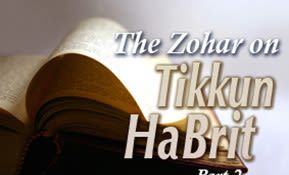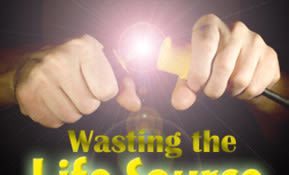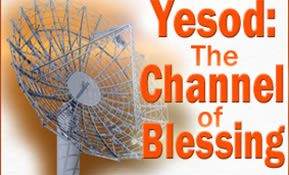The teachings of the Zohar form the basis of the book, Secret of the Brit – Torah, Kabbalah, and Sex. For the purposes of this website, only a small portion of the Zohar’s teachings on the Brit have been included, listed chronologically according to the Torah portions in which they appear. Please note that the texts printed the full width of the page are explanations of the indented quotes from the Zohar.
A man who guards his sexual purity in this world is guarded from the torments of Gehinom (Hell) in the world to come. (Zohar, Bereshit 8a)
Rav Hamnuna the Elder said this: “Do not let thy mouth cause thy flesh to sin,” (Kohelet, 5:5.) A man should not allow his mouth to utter words that may bring him to lustful thoughts, and thus cause his holy flesh, on which is stamped the holy Brit, to sin. For whoever does this is dragged into Gehinom. The one presiding over Gehinom is called Duma, and there are tens of thousands of angels of destruction with him. He stands at the door of Gehinom. But all of those who have guarded the holy covenant of the Brit in this world, he is impotent to harm them.
This passage underscores the importance of sexual purity, owing to the fact that the place of the Brit on the body parallels the sefirah of Yesod, the spiritual channel that brings Divine goodness into the world (Malchut.) (Zohar, Bereshit 47b)
“And G-d blessed the seventh day and sanctified it (“oto”) (Bereshit 2:3.)” What did He sanctify? The same place of the sign of the Brit (the word “oto” also means “his sign”) as in, “and show me both it (“oto”) and His habitation,” (Shmuel 2, 15:25.) This is the place of all of the Divine illuminations. From here they go forth to the Community of Israel and grant her delicacies and the bread of everything good….And all of the Divine illuminations that descend from the upper worlds, they go forth from this place – and this is the meaning of “and sanctified it (“oto”)” where “oto” refers to the sign of the Brit.
The following two passages explain that a man’s purity or impurity not only influence his spiritual state, they also directly influence the spiritual state of his children. (Zohar, Bereshit 54a)
“And the man knew Eve his wife…” (Bereshit 4:1.)
Rabbi Abba explained, referring to the verse: “Who knows whether the spirit of man goes upwards, and the spirit of the beast goes downward to the earth?” (Kohelet, 3:21) He said, This verse has many facets, and so it is with all the words of the Torah – they all contain several understandings, and all of them are correct. So it is that all of the Torah can be explained in seventy ways, corresponding to seventy sides and seventy wings. So it is with every word of Torah. And everything that can be understood from each and every word, there are several different facets to all.
Therefore, when a man walks in the path of truth, he goes towards the right and draws upon himself an exalted, spirit of kedusha (holiness) from above. This spirit ascends with a holy desire to attach itself to the upper world and to cleave to an exalted kedusha that never leaves him.
When a man walks in the path of evil and strays from the way, he draws upon himself an impure spirit from the left side, which pollutes his being, as it says, You shall not make yourselves abominable with them …that you should be defiled by them, (Vayikra 11:43) implying that a person who comes to pollute himself is led further into defilement.
From this we can learn that when a man walks in the path of truth, and draws upon himself a spirit of kedusha (holiness) from Above and cleaves to it, he also draws a spirit of holiness on to the son he brings into the world, so that the child will be holy with the sanctity of his Master, as it is written, “Sanctify yourselves, and you shall be holy,” (Vayikra, 11:44.)
The Zohar teaches that the flood in the days of Noach came as punishment for the sin of wasting semen. This is learned from the use of the same word, “ra” in describing Yehuda’s son Er, who was stricken by G-d for spilling his semen in vain. This sin adds strength to the spirit of impurity and drives the Shechinah from the world. (Zohar, Bereshit 56a)
“And the L-rd saw that the wickedness of man was great in the earth, and all the desire of the thoughts of his heart was only evil all of the day,” (Bereshit, 6:5.)
Rabbi Yehuda quoted the verse, “For thou art not a G-d who has pleasure in wickedness, nor shall evil (ra) dwell with Thee,” (Tehillim, 5:5.)
He explained: Come and see – someone who cleaves to the evil inclination and pursues it, not only does he defile himself, but he is led to pollute himself further, as has already been stated. For the wickedness of mankind was great (in the generation of Noach) and all kinds of evil was committed, but the measure of their guilt was not complete until they wasted their blood (semen) upon the ground. Who are these people who corrupted their way on the earth? We know by comparing two verses. Here, it is written, “Only evil (ra) all of the day,” and in another verse, “And Er, Yehuda’s firstborn, was evil (ra) in the sight of the L-rd,” (Bereshit, 38:7.)
Said Rabbi Yosi: Isn’t evil (ra) the same meaning as “wickedness” (resha)? No. A man is considered wicked if raises his hand to strike his neighbor, even if he doesn’t touch him, as it is written, “And he said to the wicked one (rasha), why will you strike your fellowman?” He is called wicked even though the future tense of the verb indicates that he had not yet done any physical harm. But, evil (ra) refers only to a person who corrupts his way and pollutes himself and the earth (by spilling semen in a sinful manner.) This lends force and added strength to the impure spirit which is called “ra” as it is written, “only evil (ra) all the day.” This person will not be allowed to enter the celestial palace, nor gaze upon the Shechinah, for by this sin the Shechinah is driven from the world.
How do we know this? From Yaacov. When the Shechinah departed from him, he thought that perhaps his sons were blemished in this manner, and because of them the impure spirit had grown stronger in the world, even blemishing the moon and diminishing its light. If you wonder how this can be – the reason is that this sin pollutes the Temple (and drives the Shechinah from the world.) If this is what caused the Shechinah to leave Yaacov, how much more so does it apply to any man who corrupts his ways and defiles himself, thus adding strength to the spirit of impurity. Therefore, when a man defiles himself in this manner, he is called evil (ra.)
Behold, when a man defiles himself, the Holy One, Blessed Be He does not visit him with blessing. Rather, he is subject at all times to visitations of the spirit called “ra.”
To be continued
***
(Secret of the Brit is reprinted with kind permission of JewishSexuality.com. Tzvi Fishman was awarded the Israel Ministry of Education Prize for Creativity and Jewish Culture. His books on Judaism and Jewish themes include: “Tuvia in the Promised Land,” “Days of Mashiach,” “The Kuzari For Young Readers,” and four books on the teachings of Rabbi Kook, “Torat Eretz Yisrael,” “War and Peace,” “The Art of T’shuva,” and “Lights on Orot,” co-written with Rabbi David Samson)












12/20/2022
Bravo c est une très dure épreuve
Mais à mon.sens vous devriez plus montrer que tout est REPARABLE MEME LA PIRE DES AVEIROT
LE REMEDE LE PLUS EFFICACE EST L ETUDE DE LA TORA DANS LA SIMHA OL FAUT Y INSISTER ET NE PAS EFFRAYER LES GENS PAR LE GUEHONOM
6/21/2022
Baruch HaShem thankyou this is a blessing for all whom come across this it has cleared up some misconceptions I have had . Baruch HaShem bless you all